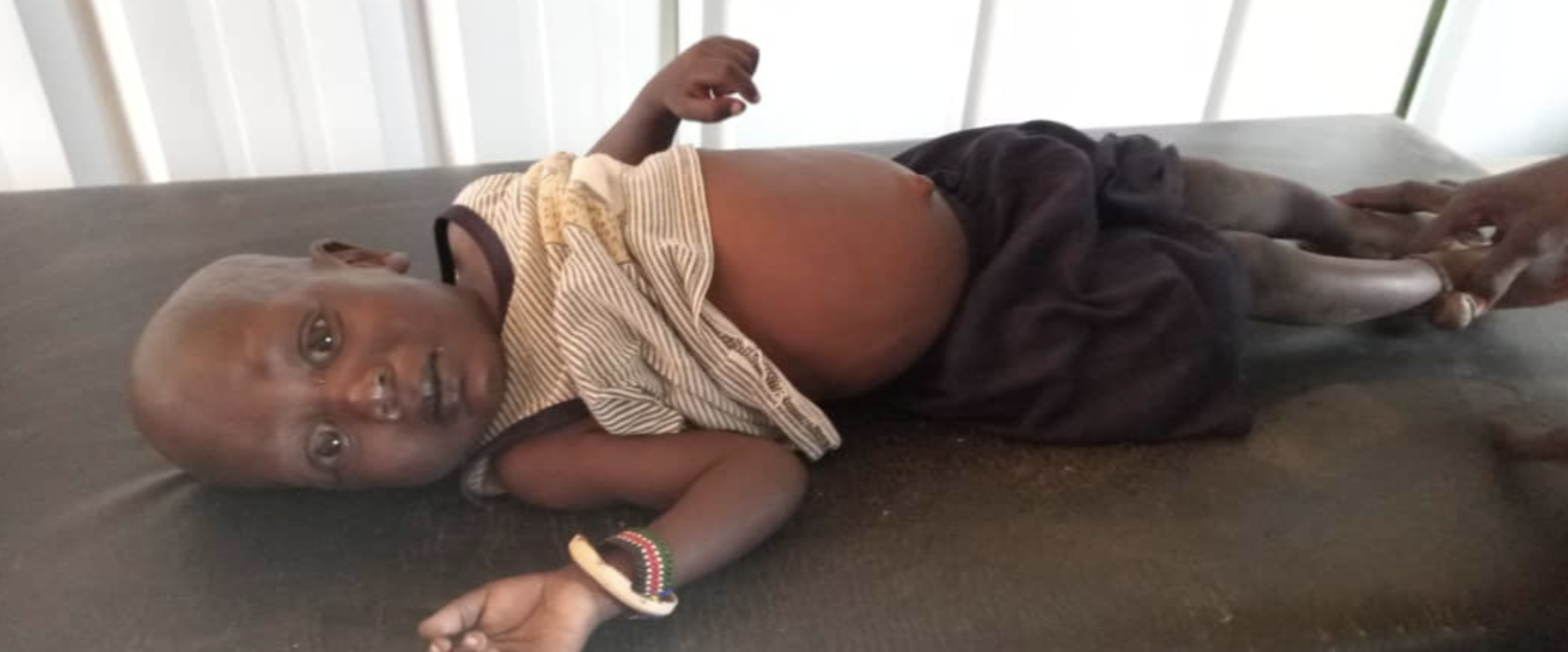INTRODUCTION
In September 2021 BCSS established a satellite clinic at Mongalla Internally Displaced Persons (IDP) camp. Since then, 184 malnourished children and 6 mothers were diagnosed with malnutrition and data suggested this was increasing. This prompted the project management to lobby for nutrition supplies. MSF (Médecins Sans Frontières/Doctors Without Borders) Swiss*, accepted our BCSS request and provided F100 milk in July 2023. BCSS staff began providing F100 milk to malnourished children at the IDP camp and nearby communities. This includes recent refugees in the camp displaced by the war in Sudan.
BEFORE NUTRITIONAL SUPPLEMENTS
Since opening in September 2021, at all diagnostic consultations, children and pregnant mothers have been screened for malnutrition. Some were diagnosed as malnourished. Our BCSS Clinical Officer provided advice to the mother and/or a child of what foods to eat. When malnourishment was severe, these clients would be referred to Juba teaching hospital for close observation and management.
For instance, this 3-year-old boy presented with malaria, enlarged spleen and severe malnutrition (Marasmus)*. Malaria was treated at BCSS, and he was quickly referred to Juba for malnutrition management because there were no treatment supplies at the Buckeye satellite clinic.

*Marasmus is a severe form of malnutrition. It is a deficiency of all macronutrients and micronutrients: carbohydrates, fats, and protein and micronutrients such as vitamins and minerals. If you have marasmus, you lack the fuel necessary to support normal body functions. People with marasmus are visibly depleted, underweight, lack appetite, and are lethargic and/or irritable. Children may be stunted in size and development and susceptible to other diseases.
AFTER NUTRITIONAL SUPPLIES:
In July 2023 BCSS received nutritional supplies. We went through our records to call the children previously diagnosed with malnutrition as well as currently seen children with malnutrition. These children were treated at Buckeye Satellite Clinic with the F100 milk provided by MSF Swiss. Most of these children are brought to the clinic with pneumonia and later diagnosed with malnutrition.
What we do before concluding that a particular child is malnourished:
- Age and weight and height of the child compared to growth charts.
- Rule out other medical conditions
- Measuring his/her mid upper arm circumference (MUAC) using the WHO recommended measuring tape
After the screening, children who fall under WHO categories are registered and admitted at Buckeye satellite clinic. F100 is given to each of them with clear instructions.
The first diluted milk is given at the facility mixed when a mother is watching so that she can do the same every 6 hours at home.
Health staff at Buckeye satellite do the following when F100 is given.
- Home visit to see the progress of the child.
- Ask the mother to demonstrate how she is mixing the milk.
- Reassessment of the child with MUAC tape after three days of feeding.
- Requesting mothers to bring their children to the clinic if they experience unusual symptoms.

NUTRITION SERVICE BENEFITS TO MONGALLA IDPs AND THE COMMUNITY:
After seeing an increased number of malnourished children, pregnant mothers and lactating mothers, MSF Swiss was requested to supply the following to treat malnourishment at the clinic.
- F100 Milk
- Plumpy nut (nutritionally made groundnut)
- Corn flour (Yellow flour)
MSF Swiss managed to supply BCSS with milk F100 and promised to give the other requested supplies once the items reach their warehouse.
The F100 positive effect is felt by the IDPs and by families in nearby communities who learn of the nutrition services now available. After one month of available services our records show 53 children from the IDPs and 37 children from host communities (a total of 90 beneficiaries) have benefited from the supplies.
LEARNINGS AND RECOMMENDATIONS:
- Seasonal changes such as the 2023 late arrival of expected May rains not beginning until June in South Sudan (Global Warming?) have led to failed crops and exacerbated malnutrition risks.
- BCSS will integrate nutrition treatment into their current activities to curb an increase in the number of persons with malnutrition.
- Engage MSF Swiss and other possible nutrition partner(s) to support BCSS with nutrition supplies.
- Share the recent number of aided malnourished children with the Central Equatoria State Ministry of Health so that they can help BCSS identify partners that can and will provide supplies.
- Encourage swift referral of severely malnourished children at BCSS Mongalla IDP Camp since we currently have the necessary supplies to manage them.
Reported by Kon Abraham, BCSS Project Manager, August 2023 and reviewed and edited by Dale Svendsen, MD, BCSS Medical Advisory Chair
